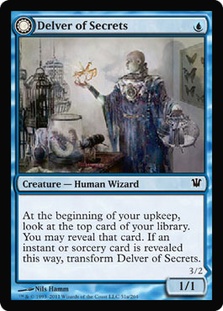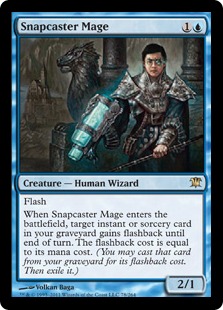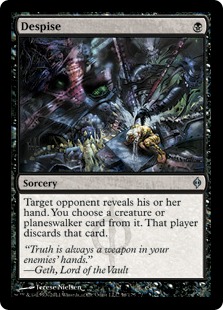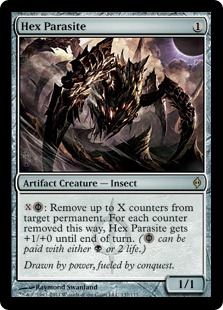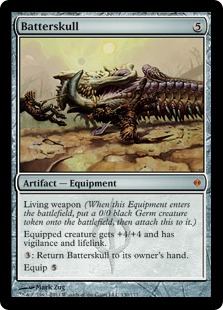"Additionally the number of people playing high level Standard events is the highest ever." – Erik Lauer Banned and Restricted List Announcement expression meaning "Wizards is a business, and it exists to make money."
I got a creepy chill down the back of my neck when I saw the comment about tournament attendance. Deja vu rarely is pleasant…but more on that later.
When I see "Wizards is a business!" in a forum or Facebook post, I often get frustrated. Usually that’s because the sentence is used as a "shut up" or trolling line, with "well, duh!" or "obv obv obv" or "hurr hurr" substituting for intelligent discourse. That Wizards of the Coast LLC is a business should be a fact, not an insult. That fact influences (or should influence) almost every decision Wizards makes, from which cards to print to which tagline to use to sell the next set.
Whenever I buy a pack of Magic cards, I’m paying a series of professionals, from game designers to artists to the public relations staff, to come together to make and market a game I love. Unprofitable businesses usually get shut down, and a future without Wizards of the Coast means no new Magic cards coming into our lives every few months and Mark Rosewater flogging spec scripts for Two and a Half Men. No thanks.
While I necessarily look at Wizards from an outsider’s perspective, I see a solid business case for banning nothing in Standard for the June 20th update. I’ll look at the general business of banning cards before getting into the specifics of why the Delver deck avoided a ban.
The Business of Banning Cards
Imagine you’re Brian Goldner, Chief Executive Officer of Hasbro. The company you run has more than $4 billion in revenue and is part of the S&P 500. Your compensation dropped 67% from 2010 to 2011, but you still made $7.6 million for your efforts.
Are you going to give two honey badgers about such minutiae as whether Delver of Secrets or Snapcaster Mage gets banned in Standard?
No way in heck. You’re taking a global view of the company. To Hasbro, Wizards of the Coast is a wholly owned but largely independent subsidiary on the opposite U.S. coast (Hasbro’s headquarters are in Rhode Island, while WotC is in Washington state), and as long as its core brands are doing what they’re supposed to do—making money—there’s no need to put Wizards under the microscope.
If you’ve worked a day in your life, you know that’s a good thing for Wizards, because the last thing you want is the boss breathing down your neck.
A similar perspective filters all the way down to the people responsible for making the actual Banned and Restricted List decisions; if the company is making the money it should, then there’s no reason for super-scrutiny. That view goes all the way down to those responsible for answering the big question, "Ban something from Standard: yes or no?"
Banning cards is a business decision, not a strictly gameplay balance decision. There is a strong (and I will say proper) bias against banning any card in any format, but particularly in Standard, the flagship Constructed format. Why? Banning a card always represents a loss. Always. It hurts players who own that card and it hurts card stores that have the banned card in stock, many of whom, like StarCityGames.com, are also among their biggest wholesale customers for cases of boxes of packs. Every banning erodes some of the long-term trust built up between Wizards and Magic tournament players that the company won’t pull the rug out from under its most dedicated and spending-happy customers. As Tom LaPille put it in "About Jace" on April 15, 2011, after the infamous Grand Prix Dallas/Fort Worth Top 8 with 32 copies of Jace, the Mind Sculptor:
"Every time you purchase Magic product, you’re doing so with the understanding that you will get to play with them in Magic tournaments we run. Specifically, you’ll be able to play with them in Eternal formats forever, in Extended tournaments for around four years, and in Standard tournaments for somewhere between fifteen months and two years.
Integrity is what makes relationships work, and we value keeping our word to you. Every time we ban a card, we are breaking that word. Therefore, we do not ban cards lightly."
The only reason for Wizards to ban a card and take that loss is if the alternative is worse.
The last time Wizards made a Standard banning, the format was so corrupted by Jace, the Mind Sculptor and Stoneforge Mystic that the former card was banned completely and the latter permitted only in an Event Deck without alteration. In "About Jace," before New Phyrexia cemented the Caw-Blade deck’s infamy, LaPille noted the difference (as Wizards Research and Development saw it then) between the Jace, the Mind Sculptor metagame and the Standards of bannings past: "When we banned Memory Jar, and when we banned Arcbound Ravager and its friends, Standard Magic wasn’t fun. The obvious indicator of that at the time was tournament attendance, which in both cases was falling. That’s not happening right now."
Then New Phyrexia was released. LaPille promised at least two cards to work against Jace, the Mind Sculptor; later, we learned from Aaron Forsythe that those cards were Despise and Hex Parasite. Meanwhile, Batterskull was in the same set, transforming Stoneforge Mystic from a nice option to a tool of oppression.
In June 2011, Aaron Forsythe wrote "Standard Bannings Explained" on why Jace, the Mind Sculptor and Stoneforge Mystic had to go. When things are going well at Wizards, official communications have an infectious enthusiasm that borders on swagger. When things are going wrong, though, the words either turn bureaucracy-brittle (the "Message from Greg Leeds" in which Wizards all but admitted it wanted to emergency ban the Planeswalker Points invitation system) or read like a confession nailed to a church door. Reading "Standard Bannings Explained" a year removed from the Caw-Blade drama, Forsythe’s frustration and hurt are clear. Through a long and honest explanation of the bannings, he said Wizards would have been willing to let the Caw-Blade metagame go if tournament players (the customers) had wanted it:
"[W]e were willing to see if players were in fact tolerant of a skill-rewarding one-deck metagame. The ultimate goal is player enjoyment, and if most people were enjoying themselves, we weren’t going to take any rash actions based solely on the math of decklists.
But then the formal complaints began pouring in, followed by a drop in attendance—pronounced at Pro Tour Qualifiers, shocking at the recent New Phyrexia Game Day, more subtle but just as real at Friday Night Magic—that we can’t ignore. If people don’t want to play the game, we need to fix it."
Even with such a strong case for multiple bannings, that almost didn’t happen because one of the Event Decks, War of Attrition, contained two copies of Stoneforge Mystic. Before the bannings were announced, many Magic players openly wondered if Wizards could ban Stoneforge Mystic because of the promises ("Play FNM right out of the box!") made for War of Attrition. Of course, Wizards eventually used the "third option" beyond the banning binary, leaving the unaltered War of Attrition list tournament-legal. When Wizards is forced into a banning situation, there are no positive solutions. The company has to pick the "least negative" instead.
Why Delver Skated
Faeries. Jund. Caw-Blade. Delver.
One of these Standard decks is not like the others. One of these Standard decks just doesn’t belong. Can you tell which…all right, I’ll cut out the Sesame Street. It’s Caw-Blade.
Think about the numbers Forsythe was throwing around in "Standard Bannings Explained" for Caw-Blade: 88% metagame saturation for Jace, the Mind Sculptor on Day 2 at Grand Prix Singapore and 70% for Stoneforge Mystic.
Faeries at its peak never came close to that. Neither did Jund. Delver hasn’t approached Caw-Blade levels of metagame saturation, either. More to the point, tournament attendance isn’t suffering; as Zac Hill noted in "Dueling Priorities," "Most importantly, tournaments [sic] attendance isn’t falling; in fact, it’s at an all-time high!"
Formats will have top-tier decks, and sometimes even a "standard to beat in Standard." As long as the money’s there, Wizards is not going to make a ban in Standard. On the other hand, there is evidence in "Dueling Priorities" that Wizards is not only more ready to ban cards in Standard compared to the pre-Caw-Blade era, but that the emergency ban, long disclaimed, may be back in the R&D arsenal: "[W]e’re keeping our eyes open and are certainly willing to take action if Delver starts to threaten the format more severely."
When, exactly, would Wizards take that action? If the company sticks to its quarterly system, the next Banned and Restricted Announcement will take place around September 20. Yet the Prereleases for Return to Ravnica will take place September 29-30, about the time a ban would go into effect. Ponder, Vapor Snag, Seachrome Coast, and other Delver nasties will rotate out on October 5 when Return to Ravnica rotates in.
Axing Vapor Snag the week before it walks out the door would be the definition of a nominal ban. This leads me to two conclusions:
1. The timing of the Banned and Restricted List Announcements needs to be rethought. It syncs up well with the spring set (appearing just about a month after release) but poorly with the rest, as seen with the September/October timing. Fixing Banned and Restricted Announcements to appear about a month after a set’s release (or more radically, altering the sets’ release schedules in conjunction with the Banned and Restricted Announcements) would be more useful.
2. If Magic 2013 worsens the Delver metagame and PTQ attendance falls, expect buzz for an emergency ban.
Miscellany
Your music recommendation: Josh Joplin Group, Useful Music. Smart, sad, brilliant, not for preteens or those prone to depression, but truly "useful music" for everyone else.
A brief sketch for post-rotation Standard that moves Wolf Run Ramp away from the board sweepers and more towards endurance:
Creatures (22)
- 4 Solemn Simulacrum
- 1 Birds of Paradise
- 4 Primeval Titan
- 4 Viridian Emissary
- 4 Huntmaster of the Fells
- 1 Elderscale Wurm
- 4 Thragtusk
Lands (26)
Spells (12)

Brindle Boar is another option that didn’t quite fit my plans. If rumors of a certain Ravnica land-search reprint are true, a few copies may be useful, though more Mountains may be called for. It is a pity that the rumors of shockland reprints didn’t pan out; alas, Stomping Ground and Primeval Titan shan’t meet in Standard. Ah well, they’ll always have Modern.
Join me in two weeks when I talk about the flavor of Magic 2013, including why I’ll be taking a Sharpie to every copy of a certain green uncommon I open.
As always, thanks for reading.
— JDB
@jdbeety on Twitter


